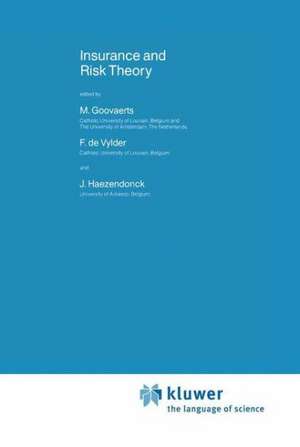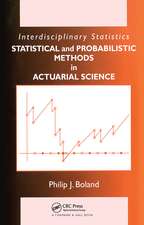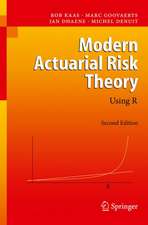Insurance and Risk Theory: Nato Science Series C:, cartea 171
Editat de Marc Goovaerts, F. Etienne De Vylder, J. Haezendoncken Limba Engleză Hardback – 31 mar 1986
| Toate formatele și edițiile | Preț | Express |
|---|---|---|
| Paperback (1) | 1226.60 lei 6-8 săpt. | |
| SPRINGER NETHERLANDS – 4 oct 2011 | 1226.60 lei 6-8 săpt. | |
| Hardback (1) | 1233.52 lei 6-8 săpt. | |
| SPRINGER NETHERLANDS – 31 mar 1986 | 1233.52 lei 6-8 săpt. |
Din seria Nato Science Series C:
- 24%
 Preț: 797.69 lei
Preț: 797.69 lei - 18%
 Preț: 957.62 lei
Preț: 957.62 lei - 18%
 Preț: 957.13 lei
Preț: 957.13 lei - 18%
 Preț: 1227.52 lei
Preț: 1227.52 lei -
 Preț: 396.40 lei
Preț: 396.40 lei -
 Preț: 403.75 lei
Preț: 403.75 lei - 18%
 Preț: 1239.37 lei
Preț: 1239.37 lei - 18%
 Preț: 1236.51 lei
Preț: 1236.51 lei - 18%
 Preț: 1231.78 lei
Preț: 1231.78 lei - 18%
 Preț: 1229.10 lei
Preț: 1229.10 lei - 18%
 Preț: 1835.21 lei
Preț: 1835.21 lei - 24%
 Preț: 1076.39 lei
Preț: 1076.39 lei -
 Preț: 390.46 lei
Preț: 390.46 lei -
 Preț: 369.63 lei
Preț: 369.63 lei - 18%
 Preț: 1232.41 lei
Preț: 1232.41 lei -
 Preț: 394.51 lei
Preț: 394.51 lei - 18%
 Preț: 1226.24 lei
Preț: 1226.24 lei - 18%
 Preț: 1845.80 lei
Preț: 1845.80 lei -
 Preț: 399.88 lei
Preț: 399.88 lei -
 Preț: 384.28 lei
Preț: 384.28 lei -
 Preț: 390.88 lei
Preț: 390.88 lei -
 Preț: 381.19 lei
Preț: 381.19 lei - 18%
 Preț: 1848.64 lei
Preț: 1848.64 lei - 18%
 Preț: 951.14 lei
Preț: 951.14 lei - 18%
 Preț: 1230.35 lei
Preț: 1230.35 lei - 18%
 Preț: 1236.51 lei
Preț: 1236.51 lei -
 Preț: 401.03 lei
Preț: 401.03 lei -
 Preț: 406.25 lei
Preț: 406.25 lei - 18%
 Preț: 1230.84 lei
Preț: 1230.84 lei -
 Preț: 418.34 lei
Preț: 418.34 lei - 18%
 Preț: 1223.74 lei
Preț: 1223.74 lei
Preț: 1233.52 lei
Preț vechi: 1504.29 lei
-18% Nou
Puncte Express: 1850
Preț estimativ în valută:
236.07€ • 245.54$ • 194.88£
236.07€ • 245.54$ • 194.88£
Carte tipărită la comandă
Livrare economică 12-26 aprilie
Preluare comenzi: 021 569.72.76
Specificații
ISBN-13: 9789027722034
ISBN-10: 902772203X
Pagini: 504
Ilustrații: XII, 488 p.
Dimensiuni: 155 x 235 x 32 mm
Greutate: 0.9 kg
Ediția:1986
Editura: SPRINGER NETHERLANDS
Colecția Springer
Seria Nato Science Series C:
Locul publicării:Dordrecht, Netherlands
ISBN-10: 902772203X
Pagini: 504
Ilustrații: XII, 488 p.
Dimensiuni: 155 x 235 x 32 mm
Greutate: 0.9 kg
Ediția:1986
Editura: SPRINGER NETHERLANDS
Colecția Springer
Seria Nato Science Series C:
Locul publicării:Dordrecht, Netherlands
Public țintă
ResearchCuprins
Opening session.- Invited lecture : Risk Theory, a Tool for Management?.- Main lectures.- Economic Ideas in Risk Theory.- Simulation in Insurance.- Application of the Problem of Moments to Various Insurance Problems in Non-life.- Application of Martingales in Risk Theory.- Applications of Operations-Research Techniques in Insurance.- Recent Research on the Risk Return Relationship in Financial Economics.- General Regression in Multidimensional Credibility Theory.- Ruin Theory under the Submartingale Assumption.- A rigorous Proof of a Property of the Premium Principle of Zero Utility in the Case of Additivity.- Bayesian Credibility with a Noninformative Prior.- Short communications.- Separation Theorems in Proportional Reinsurance.- A new Treatment of the Engineering Aspects of the “Zero-Infinity Dilemmas” of Industrial Risk Management.- On a Functional-Differential Equation connected with the Premium Principle of Zero Utility.- Markov Processes between Moving Barriers — Moments of the first Hitting Time of Retaining or Absorbing Barrier.- Some Mathematical Aspects of Combining Proportional and Non-Proportional Reinsurance.- The Moments of Compound Interest Functions when Interest fluctuates as a Compound Markov Chain.- Pension Funding and random Rates of Return.- Bayes Criterion, the Minimax Principle and Statistical Decision Theory.- Large Claims —.- Some Numerical Methods for Calculating Semilinear Credibility Estimators.- Weak Convergence of Risk Processes.- On the Exposed to Risk Theory.- Probability Bounds on Compound Distributions with given Moments on Claim Severities.- Additivity and Premium Calculation Principles.- Computing Moments of Compound Distributions.- Portfolio Valuation in Life Insurance.- Risk Assessment of Merger, Acquisition, andConsolidation of Financial Services.- Extending Arrow-Pratt Risk Premiums.- On Optimal Deductibles.- Solvency Margin and Profit in Life Insurance.- Statistical Methods in General Insurance.- Modelling Motor Insurance Claim Frequencies.- General Bounds on Ruin Probabilities.- Strict Liability and Insurance under Loss Misestimation.









